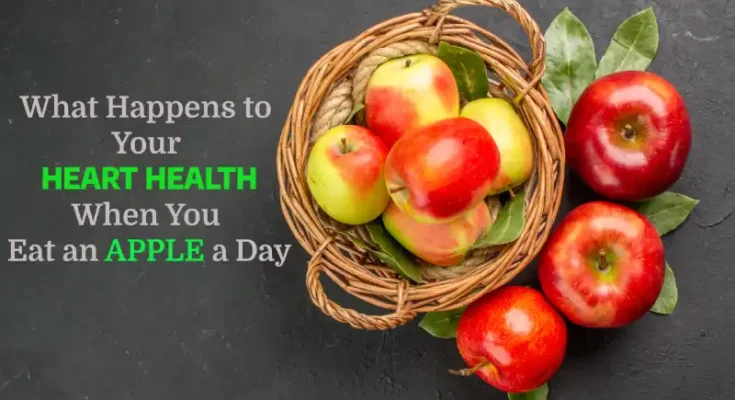Maintaining a healthy heart is essential for overall well-being. Cardiovascular diseases, such as high blood pressure, heart attack, and stroke, remain among the leading causes of death worldwide. While regular exercise, stress management, and avoiding smoking are critical for heart health, your diet plays a significant role. One of the simplest and most effective ways to support cardiovascular health is by including an apple for a healthy heart in your daily routine. Packed with nutrients, fiber, and antioxidants, apples can help protect your heart and reduce the risk of heart-related problems over time.
Including apples in your daily diet is one of the easiest and tastiest ways to support your heart. These fruits are rich in soluble fiber, vitamins, and powerful antioxidants that help reduce cholesterol, lower blood pressure, and protect against heart disease. The classic saying, “an apple a day keeps the doctor away,” is especially true for maintaining cardiovascular health. For a detailed guide on the benefits of apples and other heart-friendly foods, check out our comprehensive heart health guide. Eating an apple daily can be a simple yet effective step toward a healthier heart.
Nutrients in Apples That Support Heart Health
Apples are more than just tasty fruits; they are packed with bioactive compounds that contribute to heart protection. Here’s a closer look:
Potassium
- Potassium helps balance sodium levels in the body. High sodium intake can elevate blood pressure, increasing the risk of heart disease.
- A diet rich in potassium can help relax blood vessel walls and reduce strain on the heart.
- According to the American Heart Association, adequate potassium intake is associated with lower blood pressure and a reduced risk of stroke.
Soluble Fiber (Pectin)
- Apples contain pectin, a type of soluble fiber that binds to cholesterol in the digestive system and helps remove it from the body.
- This process reduces LDL (“bad”) cholesterol without affecting HDL (“good”) cholesterol.
- Research in The American Journal of Clinical Nutrition highlights that higher fiber intake is linked to a significantly lower risk of coronary heart disease.
Flavonoids (Quercetin, Catechin, Epicatechin)
- These plant compounds act as powerful antioxidants, reducing oxidative stress and inflammation in blood vessels.
- Flavonoids also improve the function of the endothelium, the inner lining of arteries, keeping them flexible and healthy.
- A study in Advances in Nutrition reported that diets high in flavonoid-rich fruits like apples are associated with reduced cardiovascular risk.
How Apples Improve Heart Function
Eating apples regularly can have several direct benefits for the cardiovascular system:
Maintain Healthy Blood Pressure
- Potassium in apples helps regulate fluid balance and relax blood vessels.
- Maintaining optimal blood pressure reduces strain on the heart and lowers the risk of hypertension-related complications.
Support Flexible Arteries
- Polyphenols and flavonoids in apples improve arterial flexibility, ensuring smooth blood flow.
- Flexible arteries are less prone to plaque buildup, reducing the risk of heart attacks.
Lower Risk of Heart Attack and Stroke
- Apples help reduce LDL cholesterol and inflammation, two major contributors to atherosclerosis.
- Long-term consumption may decrease the risk of ischemic stroke and other cardiovascular events.
Reduce Oxidative Stress
- Oxidative stress damages cells in the cardiovascular system. Antioxidants in apples help neutralize free radicals, protecting heart tissue.
Research Studies on Apples and Heart Health
Several studies support the link between apple consumption and improved heart health:
Clinical Evidence
- A study in the European Journal of Clinical Nutrition found that adults consuming apples had reduced LDL cholesterol levels.
- Another trial suggested that apple polyphenols improve endothelial function and reduce markers of inflammation in the blood.
Population-Based Findings
- The Women’s Health Study, following nearly 40,000 women over 10 years, reported that higher intake of flavonoid-rich foods, including apples, correlated with a lower risk of cardiovascular disease.
- Data from the Iowa Women’s Health Study also indicated that regular apple consumption was linked to reduced mortality from heart disease.
These studies show that apples are not just a healthy snack but a strategic addition to a heart-protective diet.
Best Ways to Eat Apples for Heart Benefits
To gain maximum cardiovascular benefits, consider these tips:
Eat Apples with Skin
- Most fiber, flavonoids, and polyphenols are concentrated in the skin.
- Washing thoroughly or choosing organic apples ensures safety from pesticides.
Pair with Heart-Friendly Foods
- Combining apples with oats provides additional soluble fiber, further lowering cholesterol.
- Adding nuts offers healthy fats and plant sterols that complement apples’ heart-protective properties.
Choose Whole Apples Over Juice
- Whole apples contain more fiber and fewer sugars than apple juice.
- Juice often lacks the skin, which means missing out on essential flavonoids and polyphenols.
Include Variety
- Red, green, and yellow apples all contain beneficial nutrients. Varying apple types ensures a broader intake of antioxidants and fibers.
Key Takeaways
- Apples are a natural ally for heart health, rich in potassium, soluble fiber, and flavonoids.
- Regular consumption may help:
- Reduce blood pressure.
- Lower LDL cholesterol.
- Improve arterial flexibility.
- Reduce inflammation and oxidative stress.
- Lower risk of heart attack and stroke.
- For best results:
- Eat apples with the skin.
- Pair with oats or nuts for added benefits.
- Prefer whole apples over juice.
In conclusion, making apples a part of your daily diet is an easy and effective strategy to support cardiovascular health. A simple habit of eating an apple a day may not only satisfy your taste buds but also protect your heart for years to come.
References
- American Heart Association – Potassium and Heart Health
- The American Journal of Clinical Nutrition – Fiber and Coronary Heart Disease Risk
- Advances in Nutrition – Flavonoids and Cardiovascular Health
- European Journal of Clinical Nutrition – Apple Consumption and LDL Cholesterol
- Women’s Health Study – Flavonoid Intake and Cardiovascular Disease Risk




